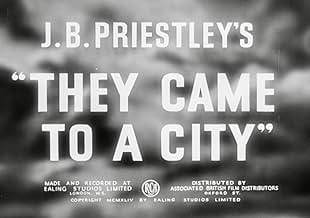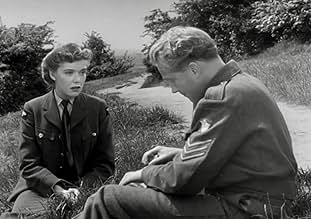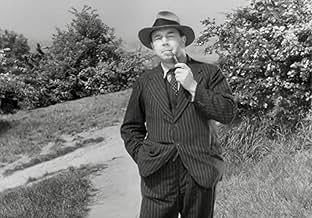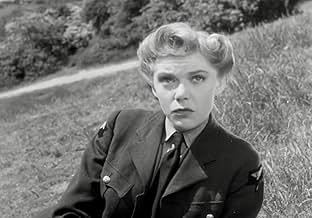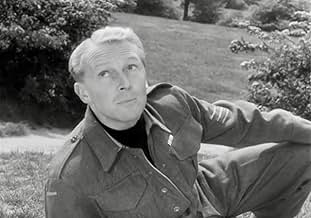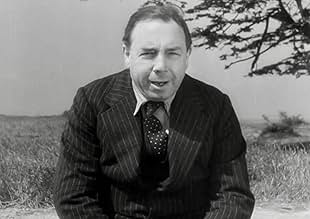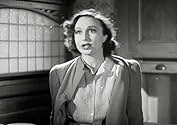Adapted from a J.B. Priestley play with many of the original actors. The tale of various people who have come to live in an "ideal" city and their hopes and reasons for doing so.Adapted from a J.B. Priestley play with many of the original actors. The tale of various people who have come to live in an "ideal" city and their hopes and reasons for doing so.Adapted from a J.B. Priestley play with many of the original actors. The tale of various people who have come to live in an "ideal" city and their hopes and reasons for doing so.
Mabel Terry-Lewis
- Lady Loxfield
- (as Mabel Terry Lewis)
Fanny Rowe
- Philippa Loxfield
- (as Frances Rowe)
Brenda Bruce
- WAAF
- (uncredited)
Ralph Michael
- Sergeant Jimmy
- (uncredited)
J.B. Priestley
- J.B. Priestley
- (uncredited)
Johnnie Schofield
- Bert the Barman
- (uncredited)
Featured reviews
A British drama; A story about how people might live if they were presented with the opportunity to live in a utopia, an "ideal" city, exploring their hopes and reasons for doing so. This is an eloquent, stagy allegory based on a play of the same title by J. B. Priestley. The direction, acting, and photography are all good, apart from occasional fits of overcooked melodrama within its bounds. It is an intelligent screenplay, but the tale within it lacks cinematic dimension with long, static sequences of dialogue; the audience is robbed of the pictorial element of what is hinted at about the mysterious settlement. Tied to this is a quite heavy political slant in the script, which is left for the viewer to accept as a task rather than for them to explore by diversion; the audience is locked out. Though the theme of universal friendship is explored well.
THEY CAME TO A CITY is based on a play by J.B. Preistley and stars Googie Withers and John Clements. It's sort of an "Outward Bound" story of disparate people who find themselves on a road that leads to a monolithic waiting room before a giant door. While waiting, each person explains his/her life, hopes, gripes, etc. When the door finally opens they descend in "the city." We never see it. As they emerge from the city, some are struck by the new social order, happiness of the people, the freedom, etc. while others are repelled by what they see. This utopia seems based on socialist views.
Coming toward the end of WWII, the story is framed by a couple sitting by a roadside overlooking a manufacturing city. They are arguing about what kind of world will emerge after the war. Will things be different. A man wanders by (J.B. Priestley himself) and he joins in, telling the story of his utopia.
Those who hate "the city" include a selfish dowager who browbeats her mousy daughter, a man of the landed gentry who lives on inherited money, a ruthless industrialist who makes money in order to make more money, and a jealous wife who hates anyone to has the things she wants. Those who like the city include the mousy daughter, an old charwoman, the henpecked husband, the world-weary barmaid (Withers), and the stoker (Clements) who has searched the world for a paradise.
While not very cinematic, the overall idea is quite interesting, and the actors (mostly from the stage play) are quite good. Besides Withers and Clements, the film co-stars Raymond Huntley and Renee Gadd as the Strittons, Ada Reeve as the charwoman, Mabel Terry-Lewis and Frances Rowe as the dowager and daughter, A.E. Matthews as the industrialist, Norman Shelley as the landed gentry.
Coming toward the end of WWII, the story is framed by a couple sitting by a roadside overlooking a manufacturing city. They are arguing about what kind of world will emerge after the war. Will things be different. A man wanders by (J.B. Priestley himself) and he joins in, telling the story of his utopia.
Those who hate "the city" include a selfish dowager who browbeats her mousy daughter, a man of the landed gentry who lives on inherited money, a ruthless industrialist who makes money in order to make more money, and a jealous wife who hates anyone to has the things she wants. Those who like the city include the mousy daughter, an old charwoman, the henpecked husband, the world-weary barmaid (Withers), and the stoker (Clements) who has searched the world for a paradise.
While not very cinematic, the overall idea is quite interesting, and the actors (mostly from the stage play) are quite good. Besides Withers and Clements, the film co-stars Raymond Huntley and Renee Gadd as the Strittons, Ada Reeve as the charwoman, Mabel Terry-Lewis and Frances Rowe as the dowager and daughter, A.E. Matthews as the industrialist, Norman Shelley as the landed gentry.
Not exactly highly entertaining but it's not supposed to be entertaining as it's a comparison of posh rich people to poor ones.
Unsurprisingly the rich posh ones are not keen on a society where all are equal so the privileged positions that they currently enjoy would be lost. Eighty years later and nothing has changed as the rich continue to get richer and the poor get poorer.
My favourite character was the washerwoman who held the film together with her comments.
The set must have been very cheap to construct as it seemed to have been made of plywood painter to resemble stone.
Worth a watch but don't expect any excitement like a car chase for example.
Unsurprisingly the rich posh ones are not keen on a society where all are equal so the privileged positions that they currently enjoy would be lost. Eighty years later and nothing has changed as the rich continue to get richer and the poor get poorer.
My favourite character was the washerwoman who held the film together with her comments.
The set must have been very cheap to construct as it seemed to have been made of plywood painter to resemble stone.
Worth a watch but don't expect any excitement like a car chase for example.
The main title actually says 'J. B. Priestley's They Came to a City', and the film constitutes the second of three brief wartime flirtations with fantasy by Ealing Studios.
Coming late in the war when enlightened opinion was already contemplating what was to come next, the ideals it expressed had already found voice in the Boulting Brothers short 'Dawn Guard' and thematically owed a lot to Sutton Vane's 'Outward Bound', James Hilton's 'Lost Horizon' and Priestley's own 1937 fantasy 'I Have Been Here Before'; while the striking production design seems to show the influence of German silent cinema.
Beginning and ending with the genial figure of Mr Priestley ambling on and off, it's not for all tastes, but is certainly quite unlike any other British film before or after.
Coming late in the war when enlightened opinion was already contemplating what was to come next, the ideals it expressed had already found voice in the Boulting Brothers short 'Dawn Guard' and thematically owed a lot to Sutton Vane's 'Outward Bound', James Hilton's 'Lost Horizon' and Priestley's own 1937 fantasy 'I Have Been Here Before'; while the striking production design seems to show the influence of German silent cinema.
Beginning and ending with the genial figure of Mr Priestley ambling on and off, it's not for all tastes, but is certainly quite unlike any other British film before or after.
Nine disagreeable Britons representing different social/economic classes are mysteriously transported to a place with a door. As they wait for the door to open, we get to know them better. Eventually the door opens, and they go explore a city which the audience never sees. T The idea is that post WW2, England should become a more fair and equitable society with people who treat each other well. When the characters find themselves in such a city they have different reactions. It's interesting how some of the selfish ones try to emotionally drag those who want to live in the city back to their miserable lives. There is an episode involving a mother and daughter that is very similar to an episode in C. S. Lewis' novel "The Great Divorce" written 12 years later. It made me wonder if Mr. Lewis ever saw the film. Note: "They Came To A City" is similar to watching a stage play. At only 66 minutes long it's worth a look.
Did you know
- TriviaFinal film of Mabel Terry-Lewis.
- Quotes
Alice Foster: I never thought there *could* be a place as good as this.
- ConnectionsFeatured in Sosialismi (2014)
- SoundtracksMusic selected from The Divine Poem
Music by Aleksandr Skryabin (as Scriabin)
Played by The London Philharmonic Orchestra
Conducted by Ernest Irving
Details
- Runtime
- 1h 18m(78 min)
- Color
- Aspect ratio
- 1.37 : 1
Contribute to this page
Suggest an edit or add missing content

